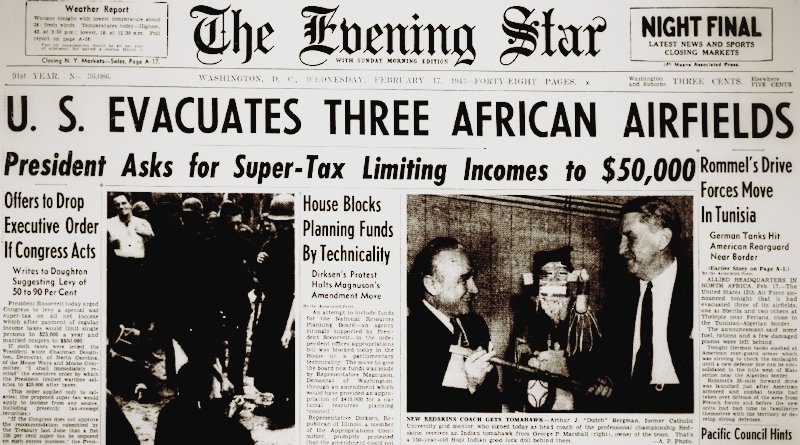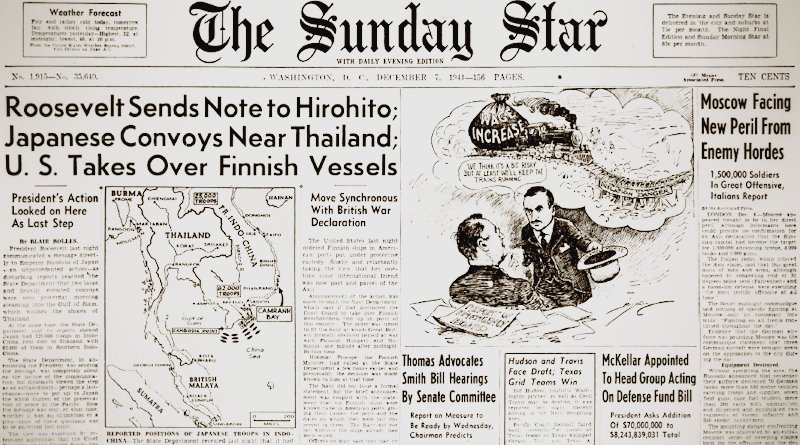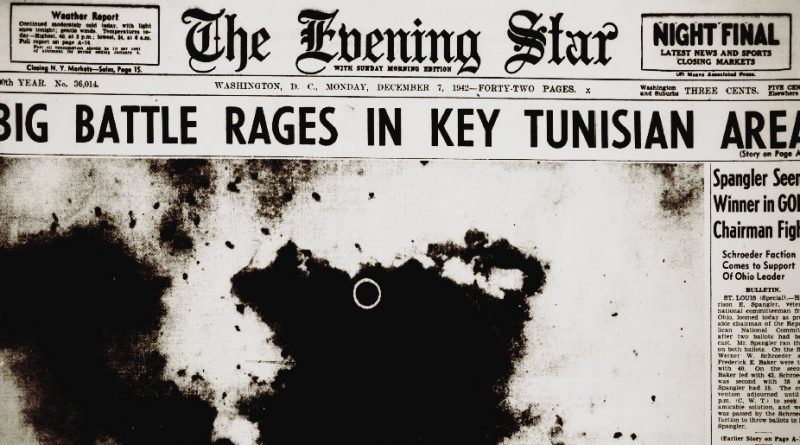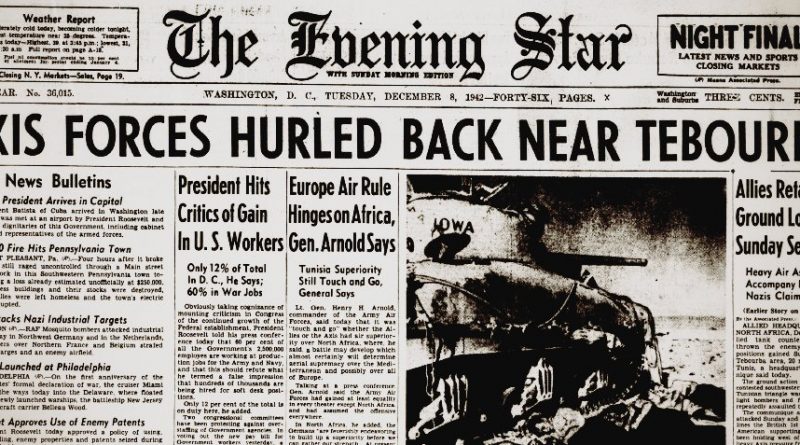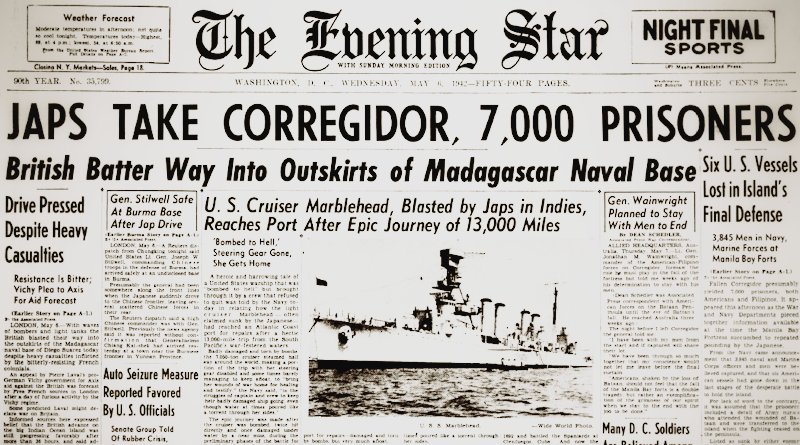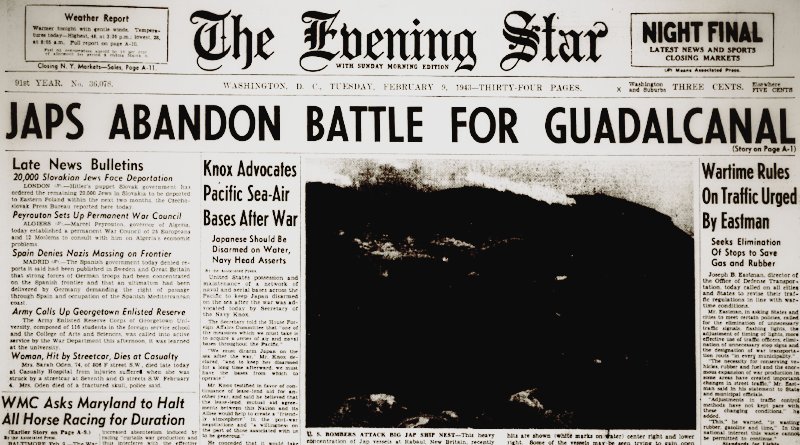World War II Chronicle: February 17, 1943
Click here for TODAY’S NEWSPAPER
On page five: A North Dakota boy made it to the very last stage of flexible gunnery school in Tyndall Army Air Field before an officer realized that the soldier was only 14 years old. Had Albert E. Ennis not gotten airsick he would have graduated and pinned on sergeant stripes. So if you find yourself wandering through a cemetery in Doonybrook, N.D. and see a gravestone of a private first class born in 1929 with “WORLD WAR II” on the grave marker, it’s no phony…
Also on the page is an interesting list of what not to do in the Pacific. Marines have learned all these lessons the hard way while fighting the Japanese… Page seven reports that several “privileges” have been restored to Jewish soldiers in the French Army. They can now request transfers to units that do not have Muslims and soldiers that have favorable performance records or have been wounded can apply to get their old rank back. Privileges indeed…
The “revolutionary” engine on page eight is the 2,000-horsepower Pratt & Whitney R-2800 Double Wasp. All those horses require a huge (13 foot, 4 inch) Hamilton Standard Hydromatic three-blade propeller, which means the fighter needs a longer nose to keep the prop from hitting the ground as well as the iconic gull-shaped wings to bring the landing gear closer to the ground. The article mentions that the Corsair has recently had its combat debut. Marine Fighting Squadron 124 (VMF-124) arrived at Guadalcanal on Feb. 12 and got in their first fight on the 14th…
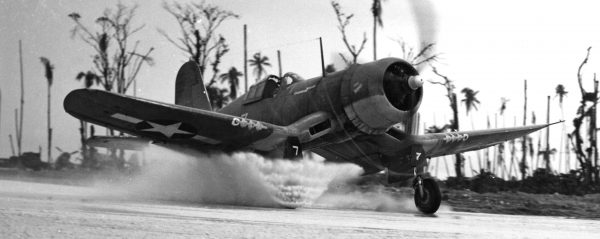
George Fielding Eliot column on page 10… Adolf Hitler has promoted Generaloberst von Richtofen to Generalfeldmarschall (see page 11). No, this isn’t the famous “Red Baron,” but his cousin Wolfram von Richtofen. Wolfram was one of three von Richtofen aces: Manfred scored 80 victories during the First World War, his brother Lothar notched 40, and Wolfram shot down eight. Behind only Hermann Göring, von Richtofen is the youngest field marshall in the Luftwaffe… Sports on page 17, which reports that baseball’s Joe DiMaggio has wished the Yankees lots of luck as he has made an appointment with the draft board to join the Army…
Bernt Balchen is one of those guys who has done it all. The Norwegian served in the French Foreign Legion at Verdun. He fought in the Finnish Civil War. He was training to be an Olympic boxer but got called away for flight school with the Norwegian Navy. He was a polar explorer, mechanic, test pilot, and competed for the Orteig Prize in 1927 for the first transatlantic flight (Charles Lindbergh beat him by a month). By 1943 he was serving in the Army Air Force. His arctic experience was invaluable on the frozen wastelands of Greenland as aircrews cris-crossed the Atlantic on the “Snowball Route.” When crews went down, Lt. Col. Balchen rode to the rescue. On page 21 he is mentioned having been awarded the new Soldiers Medal for two rescue operations. There is plenty of work ahead, so you haven’t head the last of Col. Balchen.
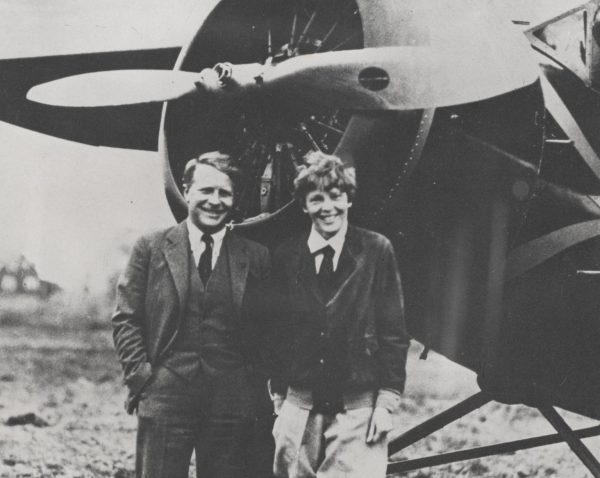
Roving Reporter by Ernie Pyle
AT THE FRONT IN TUNISIA — (By Wireless) — A big military convoy moving at night across the mountains and deserts of Tunisia is something that nobody who has been in one can ever forget.
Recently I have been living with a front-line outfit. Late one after noon it received sudden orders to move that night, bag and baggage. It had to pull out of its battle positions, time the departures of its various units to fit into the flow of traffic at the first control point on the highway, and then drive all night and go into action on another front.
All the big convoys in the war area move at night. German planes would spot a daytime convoy and play havoc with it.
It is extremely difficult and dangerous, this moving at night in total blackness over strange and rough roads. But it has to be done.
Our convoy was an immense one. There were hundreds of vehicles and thousands of men. It took seven and a half hours to pass one point.
The convoy started moving at 5:30 in the evening, just before dusk. The last vehicle didn’t clear till one o’clock the next morning.
I rode in a jeep with Capt. Pat Riddleberger, Woodstock, Va. and Pvt. John Coughlin, Manchester, N.H. Ahead of us was a small covered truck which belonged to Riddleberger’s tank-destroyer section. We were a little two-vehicle convoy within ourselves.
We were to fall in near the tail end, so we had half the night to kill before starting. We stood around the truck, parked in a barnlot, for an hour or two, just talking in the dark. Then we went into the kitchen of the farmhouse which had been used as a command post and which was empty now.
There was an electric light, and we built a fire in the kitchen fireplace out of boxes. But the chimney wouldn’t draw, and we almost choked from the smoke.
Some officers had left a stack of copies of the New York Times for October and November lying on the floor, so we read those for an hour or so. We looked at the book sections and the movie ads. None of us had ever heard of the new books or the current movies. It made us feel keenly how long we had been away and how cut off we were from home.
“They could make money just showing all the movies over again for a year after we get back,” one of the boys said.
We finished the papers and there were still three hours to kill, so we got blankets out of the truck and lay down on the concrete floor. We were sleeping soundly when Captain Riddleberger awakened us at 1 a.m. and said we were off.
The moon was just coming out. The sky was crystal-clear, and the night bitter cold. The jeep’s top was down.
We all put on all the clothes we had. In addition to my usual polar-bear wardrobe, which includes heavy underwear and two sweaters, I wore that night a pair of coveralls, a heavy combat suit that a tank man lent me, a pair of overshoes, two caps — one on top of the other — and over them a pair of goggles. And all three of us in the jeep wrapped up in blankets.
In spite of all that, we almost froze before the night was over.
We moved out of the barnlot, and half a mile away we swung onto the main road, at the direction of motorcyclists who stood there guiding the traffic.
Gradually our eyes grew accustomed to the half-darkness, and it wasn’t hard to follow the road. We had orders to drive in very close formation, so we kept within 50 feet of each other.
After a few miles we had to cross over a mountain range. There were steep grades and switchback turns, and some of the trucks had to back and fill to make the sharper turns.
There was a considerable delay on the mountain. French trucks and busses would pass and tie up traffic, swinging in and out. And right in the center of these torturous mountains we met a huge American hospital unit, in dozens of trucks, moving up to the front. They were on the outside of the road, and at times their wheels seemed about to slide off into the chasm.
We had long waits while traffic jams ahead were cleared. We would shut off our motors and the night would be deathly silent except for a subdued undertone of grinding motors far ahead. At times we could hear great trucks groaning in low gear on steep grades far below, or the angry clanking of tanks as they took sharp turns behind us.
Finally the road straightened out on a high plateau. There we met a big contingent of French troops moving silently toward the front we had just vacated. The marching soldiers seemed like dark ghosts in the night. Hundreds of horses were carrying their artillery, ammunition and supplies.
I couldn’t help feeling the immensity of the catastrophe that has put men all over the world, millions of us, to moving in machine-like precision throughout long foreign nights — men who should be comfortably asleep in their own warm beds at home.
War makes strange giant creatures out of us little routine men who inhabit the earth.
Evening star. (Washington, D.C.), 17 February 1943. Chronicling America: Historic American Newspapers. Lib. of Congress.
https://chroniclingamerica.loc.gov/lccn/sn83045462/1943-02-17/ed-1/
